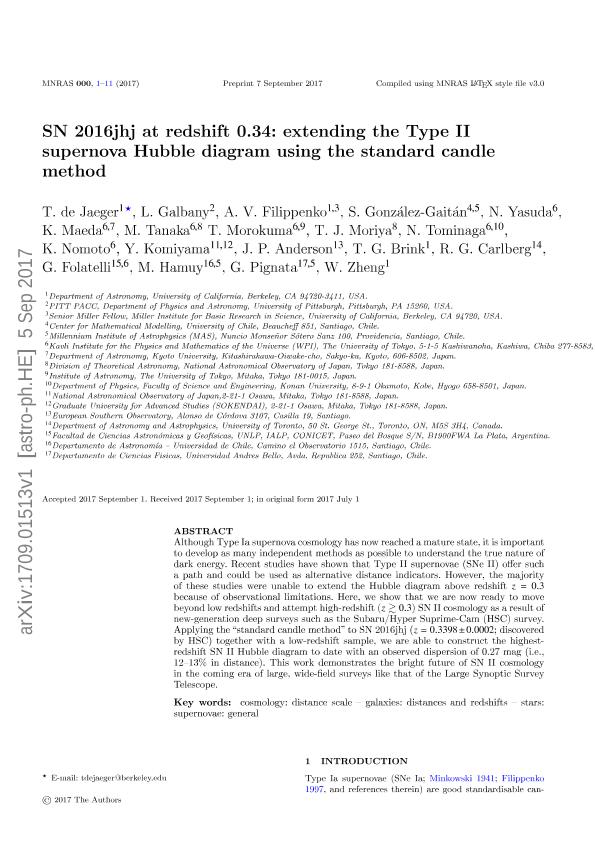Mostrar el registro sencillo del ítem
dc.contributor.author
de Jaeger, T.
dc.contributor.author
Galbany, L.
dc.contributor.author
Filippenko, A. V.
dc.contributor.author
González Gaitán, S.
dc.contributor.author
Yasuda, N.
dc.contributor.author
Maeda, K.
dc.contributor.author
Tanaka, M.
dc.contributor.author
Morokuma, T.
dc.contributor.author
Moriya, T. J.
dc.contributor.author
Tominaga, N.
dc.contributor.author
Nomoto, Ken’ichi

dc.contributor.author
Komiyama, Y.
dc.contributor.author
Anderson, J. P.
dc.contributor.author
Brink, T. G.
dc.contributor.author
Carlberg, R. G.
dc.contributor.author
Folatelli, Gaston

dc.contributor.author
Hamuy, M.
dc.contributor.author
Pignata, G.
dc.contributor.author
Zheng, W.
dc.date.available
2018-04-06T18:33:15Z
dc.date.issued
2017-12
dc.identifier.citation
de Jaeger, T.; Galbany, L.; Filippenko, A. V.; González Gaitán, S.; Yasuda, N.; et al.; SN 2016jhj at redshift 0.34: extending the Type II supernova Hubble diagram using the standard candle method; Wiley Blackwell Publishing, Inc; Monthly Notices of the Royal Astronomical Society; 472; 4; 12-2017; 4233-4243
dc.identifier.issn
0035-8711
dc.identifier.uri
http://hdl.handle.net/11336/41203
dc.description.abstract
Although Type Ia supernova cosmology has now reached a mature state, it is important to develop as many independent methods as possible to understand the true nature of dark energy. Recent studies have shown that Type II supernovae (SNe II) offer such a path and could be used as alternative distance indicators. However, the majority of these studies were unable to extend the Hubble diagram above redshift z = 0.3 because of observational limitations. Here, we show that we are now ready to move beyond low redshifts and attempt high-redshift (z ≳ 0.3) SN II cosmology as a result of new-generation deep surveys such as the Subaru/Hyper Suprime-Cam survey. Applying the ´standard candle method´ to SN 2016jhj (z = 0.3398 ± 0.0002; discovered by HSC) together with a low-redshift sample, we are able to construct the highest-redshift SN II Hubble diagram to date with an observed dispersion of 0.27 mag (i.e. 12-13 per cent in distance). This work demonstrates the bright future of SN II cosmology in the coming era of large, wide-field surveys like that of the Large Synoptic Survey Telescope.
dc.format
application/pdf
dc.language.iso
eng
dc.publisher
Wiley Blackwell Publishing, Inc

dc.rights
info:eu-repo/semantics/openAccess
dc.rights.uri
https://creativecommons.org/licenses/by-nc-sa/2.5/ar/
dc.subject
Supernova
dc.subject
Redshifts
dc.subject
Distance Scale
dc.subject.classification
Astronomía

dc.subject.classification
Ciencias Físicas

dc.subject.classification
CIENCIAS NATURALES Y EXACTAS

dc.title
SN 2016jhj at redshift 0.34: extending the Type II supernova Hubble diagram using the standard candle method
dc.type
info:eu-repo/semantics/article
dc.type
info:ar-repo/semantics/artículo
dc.type
info:eu-repo/semantics/publishedVersion
dc.date.updated
2018-03-26T14:39:57Z
dc.journal.volume
472
dc.journal.number
4
dc.journal.pagination
4233-4243
dc.journal.pais
Reino Unido

dc.description.fil
Fil: de Jaeger, T.. University of California at Berkeley; Estados Unidos
dc.description.fil
Fil: Galbany, L.. University of Pittsburgh at Johnstown; Estados Unidos
dc.description.fil
Fil: Filippenko, A. V.. University of California at Berkeley; Estados Unidos
dc.description.fil
Fil: González Gaitán, S.. Universidad de Chile; Chile
dc.description.fil
Fil: Yasuda, N.. University of Tokio; Japón
dc.description.fil
Fil: Maeda, K.. University of Tokio; Japón
dc.description.fil
Fil: Tanaka, M.. University of Tokio; Japón
dc.description.fil
Fil: Morokuma, T.. University of Tokio; Japón
dc.description.fil
Fil: Moriya, T. J.. National Astronomical Observatory of Japan; Japón
dc.description.fil
Fil: Tominaga, N.. University of Tokyo; Japón
dc.description.fil
Fil: Nomoto, Ken’ichi. University of Tokyo; Japón
dc.description.fil
Fil: Komiyama, Y.. National Astronomical Observatory of Japan; Japón
dc.description.fil
Fil: Anderson, J. P.. European Southern Observatory; Chile
dc.description.fil
Fil: Brink, T. G.. University of California at Berkeley; Estados Unidos
dc.description.fil
Fil: Carlberg, R. G.. University of Toronto; Canadá
dc.description.fil
Fil: Folatelli, Gaston. Universidad Nacional de La Plata. Facultad de Ciencias Astronómicas y Geofísicas; Argentina. University of Tokyo; Japón
dc.description.fil
Fil: Hamuy, M.. Universidad de Chile; Chile
dc.description.fil
Fil: Pignata, G.. Universidad Andrés Bello; Chile
dc.description.fil
Fil: Zheng, W.. University of California at Berkeley; Estados Unidos
dc.journal.title
Monthly Notices of the Royal Astronomical Society

dc.relation.alternativeid
info:eu-repo/semantics/altIdentifier/doi/http://dx.doi.org/10.1093/mnras/stx2300
dc.relation.alternativeid
info:eu-repo/semantics/altIdentifier/url/https://academic.oup.com/mnras/article/472/4/4233/4107125
Archivos asociados
